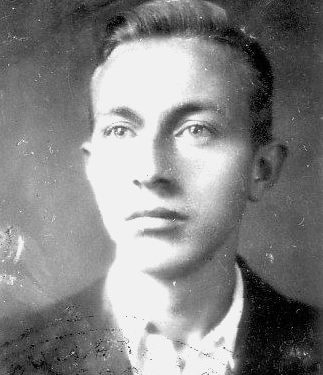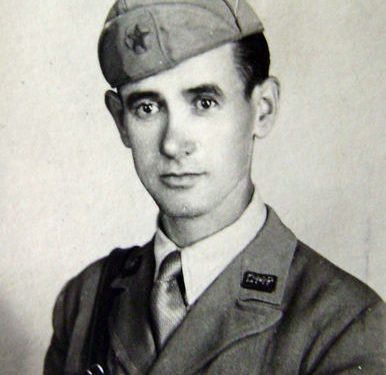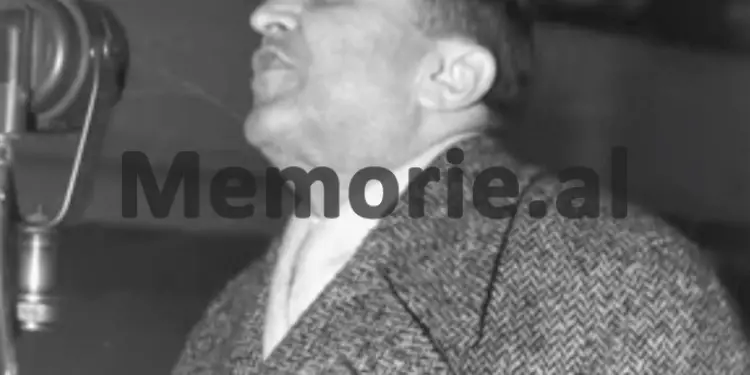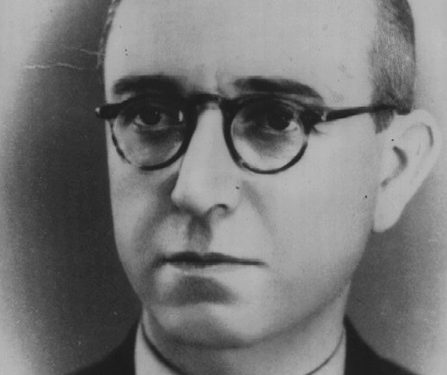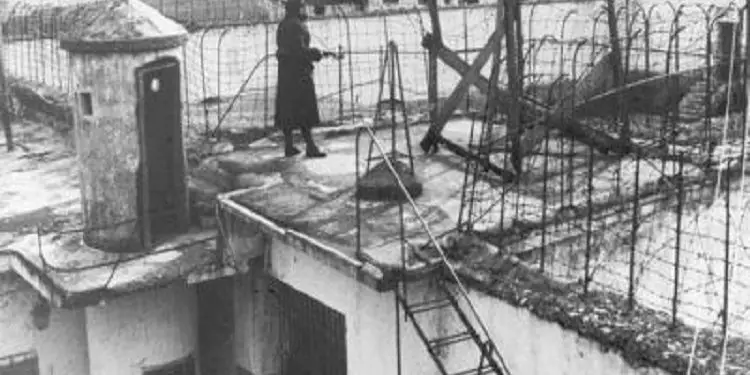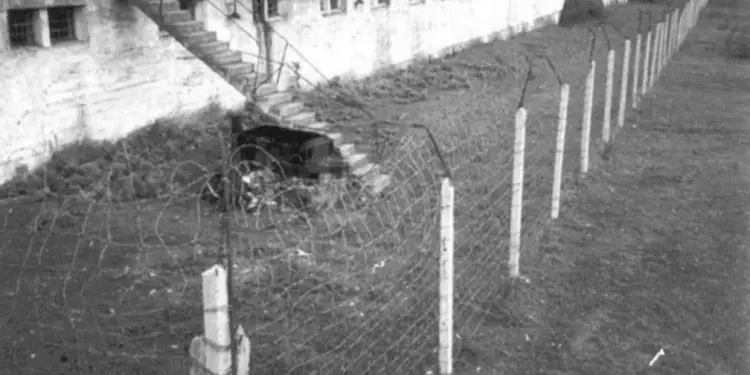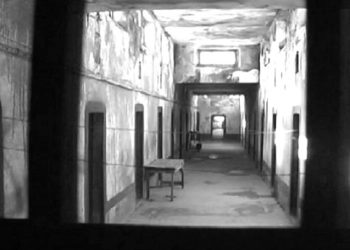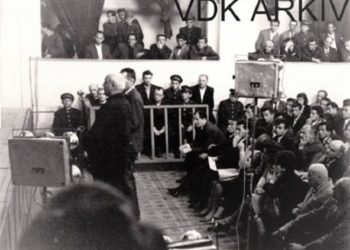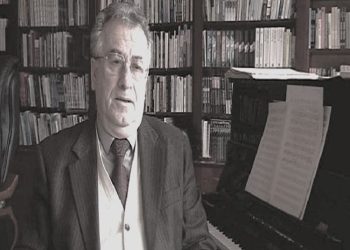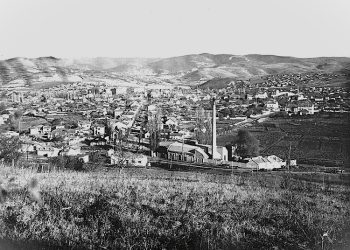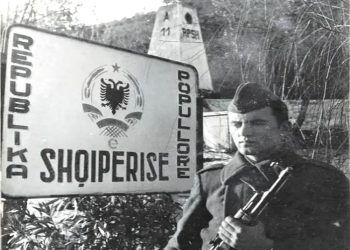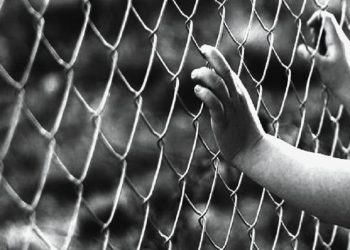By Uran Kalakulla
Part thirty-three
Nazism and communism
Memorie.al / Nazism lasted 12 years, while Stalinism lasted twice as long. In addition to many common characteristics, there are many differences between them. The hypocrisy and demagogy of Stalinism was of a more subtle nature, which was not based on a program that was openly barbaric, like Hitler’s, but on a socialist, progressive, scientific and popular ideology, in the eyes of the workers; an ideology that was like a convenient and comfortable curtain to lie to the working class, to lull the sharpness of intellectuals and rivals in the struggle for power.
One of the consequences of this peculiarity of Stalinism is that the entire Soviet people, its best, capable, hardworking and honest representatives, suffered the most terrible blow. At least 10-15 million Soviets lost their lives in the torture chambers of the KGB, martyred or executed, as well as in the gulag camps and others like them, camps where it was forbidden to correspond (in fact, they were prototypes of the Nazi death camps); in the mines in the ice of Norilsk and Vorkuta, where people died from cold, hunger, from crushing labor in countless construction sites, in the exploitation of forests, in the opening of canals and during transportation in leaded wagons, or in the flooded barns of the death ships.
Continued from the previous issue
For those who have neither personal experience nor accurate knowledge of the dictatorship’s prisons in our country, but have heard something about the Burrel prison, they say that that prison was underground like a kind of gallery, without light and air. Apparently, they were influenced by the films they had seen from time to time with the subject of prison, such as “The Count of Monte Cristo”, or those about Nero. Well, Burrel’s prison was not like that at all. It was an ordinary prison, not underground, and even with plenty of windows and plenty of air, because the windows there were almost never closed. Undoubtedly, that prison, from a hygienic point of view, from its location and construction, was much more comfortable, because it was newer than the Gjirokastra prison. I will even add with conviction that, as a building, it was even better than the old Tirana Prison. So, why all that bad reputation? And here’s why.
It is understood that even if they put you in a golden cage and kept you with pastries and chocolates, you would still feel bad, because they would come to your nose. Notice the beautiful birds in the cages, how they cling to its wires and their eyes are only outside them! Those who were outside the prison, more or less free (in that dictatorial regime that we Albanians unfortunately experienced), did not appreciate even the little relative freedom they had. And only in prison did you realize how much you had lost.
You had lost everything: the freedom of movement, the presence of your loved ones, the warmth of the family bed, the warm hand of your mother, the tender cheek of your child, the pleasant conversation with a friend in a simple café, a birthday party, a relaxing walk on the boulevard or in the flower garden, the pleasant smell of flowers, the freshness of the rustling waves of the sea or the sweet and soothing gurgling of a river or stream, the delicious morning coffee, a cold glass of beer in the sweltering heat, the beloved melody of a song on the radio, a selected book in the city library, a sensational news story, and so on, almost endlessly.
But in prison, what do you find? The narrowness of a place that takes your breath away, the lack of proper hygiene, the bad food, the police’s curses and insults, the very limited movement in that extremely narrow space, the air polluted by dust, cigarette smoke, the smell of unwashed bodies, the bad smells of the night (if not the day), people all talking at once as if in a narrow corner of a bazaar, often stupid words (meaningless, without value), difficult types (that you often cannot swallow, but that you are forced to have around), the slanderous “oratory” of an arrogant ignoramus, the disgusting lecture of the prison commissioner, the arrogance and kicking of the police, the “schedule” of the toilet in seconds, the torture of urination or great need at night, the frequent lack of cigarettes, the long absence of news from the family, the continuous surveillance of the operatives, the espionage of his agents near you, the arrogance and arrogance of your equals, who have more kilos and physical strength, the small ration of bread, the lack of books, etc.
We must not forget, also, the natural desire to see a flower or a blade of grass, to hear a bird chirp, a lamb bleat, the sweet voice of a child like a bird or the pleasant voice of a woman, the patience to listen all night to the snoring of the one who sleeps next to you, that very close physical approach with a previously unknown person (like sardines in a can), the arguments that escalate to beatings for an inch of sleeping space, being put in a dungeon in the dead of winter for an entire month for nothing, life reduced to a primitive vegetation of single-celled organisms, the almost instant violation of human dignity, the invisible end of that endless torture that destroys your nerves, the loss of hope, to one day get out of that hell, the fear of falling back into prison, etc., etc. So, a life that, even if you forgave the devil, he wouldn’t accept.
That was, in short, communist prison life. The communists had an extraordinary ability. They turned the normal into the abnormal, the beautiful into the ugly, justice into injustice, the delicate into something coarse, contemptible, something valuable into something useless, peace into strife and war, love into hatred, loyalty into disloyalty, espionage into merit, religion into banal atheism, idealism into gross materialism, friendship into enmity, virtue into vice, dignity into disgusting servility, the sense of solidarity and humanity into animalistic selfishness, their cultural emptiness into normative knowledge, art and literature into plagiarism, as worthless as it is ugly, freedom and human rights into a rag, into a tightly packed line of canned goods in prison or barracks, an entire people into a truly slovenly, but extremely aggressive army, regardless of the level of truth. And so on, without end.
Moreover, this ugliness was also outside the prison, throughout the so-called “People’s Socialist Republic of Albania”. When this material and spiritual misery was in the space outside the prison, how could it be inside it? Burrel Prison, like all other Albanian or world prisons, has its own history. It began to be built by the Zog government, but, since it was not completed, the Italians turned it into horse stables for their army. The Communists turned it into the most dangerous prison in the country. Because, as I said above, they were masters in building places of human torture. In human psychology there is a psychic phenomenon called “association of ideas”. In a word, when we remember an object or idea, immediately after them, another idea or object close to it comes to our mind, thus creating a kind of twinning.
For example, when we remember the Clock of Tirana, the Ethem Bey Mosque immediately appears in our mind. The image of Shkodra cannot be imagined without the Rozafa Castle and Buna below it and the lake. Kruja, without the Skanderbeg Castle and so on. These are typical Albanian images, which are connected to the essence of the history of our nation, with its soul. But the communists also created “associations of ideas” of their own nature. Thus, when the name “Spaç” is mentioned, the local mine of horror for political prisoners inevitably comes to mind. Qafa e Barit, once was an innocent geographical notion, but even there the communists established a terrible torture camp, like that of Spaç. Thus, they created a second gloomy association.
Vloçishti reminds us of the horror camp for the drying of the Maliqi swamp. Likewise with Juba, with the Copper Factory in Rubik, and many others. In this way, these places, innocent in themselves, were turned into symbols of hell by the treatment that the communists gave them. A similar fate also followed the small town of Burreli. Therefore, those who know the work of the prison, when the city was mentioned, inevitably thought of that cursed prison and, then, they would shiver, because the communists had the special ability to anathematize, to make geographical areas, parts of the Homeland cursed in the people’s memory, with the horrors they caused.
The place where that prison is located is somewhat steep and the prison, on one side, emerges above a wall and, on the opposite side, goes into the ground (almost two palms). That prison is about a hundred meters long. Today, something has changed inside, but when I was there, there were ten rooms (kausha), five on each side, with a narrow corridor in each row. These two groups of rooms were separated by a toilet with only three holes, one like a corridor with a basin where water flowed from three taps and, immediately after them, there was another long and narrow corridor, with thirteen holes on each side. The two outermost rooms, the one with no. 1 and no. 10, were slightly larger than the others, which were completely equal between them. At the end of the first narrow corridor, which started from room no. 1, was the cabin of the guard or internal guards. The walls were about half a meter thick, the entire floor was made of concrete, like the terrace above. Between the building and the surrounding wall (from the front), there was a designated square, for the ventilation of the convicts.
But you couldn’t approach the wall, because there was a forbidden area, where signs were posted with the inscription: “Danger of death”. If you trespassed there, the guards, from their positions (on the towers and on the terrace), would shoot you dead in the face with a hail of bullets. Meanwhile, on the side of the iron door, next to it, was the command building and, behind it, the soldiers’ are building. They stood guard day and night, without a break. Here, this was Burrel’s prison. That prison gained a bad reputation when it began to function as such, around 1946. The cream of the intelligentsia was locked up in it and many of them died there. The food was only 400 gr. of corn bread (molded) and a bucket of water every 24 hours.
There was no running water at that time, but only a well in the middle of the yard, where the prisoners, since there was neither a winch nor a bucket, especially for torture, filled water with their own baskets, tied with rope, invented by themselves out of distress. The first commander of that prison was a sadist with the rank of lieutenant, with the cursed name Vangjel Rrëmbeci. And, until 1949, that prison was called the “Prison of Extermination”. Because, from hunger, from diseases, from cold, from humidity, from bad treatment in the cells and from pointless punishments in the dungeons, dozens of people lost their lives, a number that began to grow more and more. I do not know the exact number of deaths in that prison, but I can say that during the time I spent there, for 14 consecutive years, dozens of convicts died and were maimed. I remember some of them: Sazan Hadëri, Salo Lezha, Karafil Kalaci (died in the prison hospital in Tirana), and especially Mustafa Bajraktar.
King Zog’s former Prime Minister, Koço Kota, was killed by Vangjel Rrëmbec’s police with a club, splattering his blood and brains on the walls of the dungeon. The intellectual Xhevat Korça was made to die on a hunger strike. Many patriotic intellectuals, prominent figures of the Albanian state and culture, have died in that prison, among which I can mention: Ethem Haxhiademi, Arqile Tasi, Gjergj Kokoshi and many others. The latter had even been a minister in Enver Hoxha’s first cabinet. Many other intellectuals, secular or clerical, also went through their ordeal in that prison, such as: Koço Tasi, Zef Mala, Kudret Kokoshi, Suat Asllani, Arshi Pipa, Patër Mëshkalla, Nikollë Mazreku, Hafiz Dërguti, Foto Bala, Andon Frashëri, etc.
The Howls of Asllan Uka
Asllan Uka was one of the dangerous guards of the Burrel prison. He was one of the oldest there and who knows how many people and souls he had tortured and killed. He was probably one of those who took many of the prison’s victims to the ground, under the cherry tree’s shade. From the name, he shouldn’t have been from Mirdita, since I don’t know if there are any Muslim residents in Mirdita. But, he was probably from somewhere nearby, maybe from Puka. I didn’t think Matjan was, because he spoke exactly like a Mirdita. Yes, damn him, if he hasn’t already!
“Asllan” is a Turkish name and its meaning in Albanian is “lion”. But Asllan was not a lion at all. Judging by his appearance and, especially, his voice, with a very high pitch, with a very ugly howl, exactly like a hungry jackal, he resembled a hyena or jackal. Thin in stature, with a long, yellow face like a dog’s, he had exactly the eyes of a hyena, whose eyes glowed like burning coals in the dark at night. His thin, long nose was twisted somewhat to the left, as if by a furious Bolshevik zeal, while his mouth, with those thin, pale lips, was drawn sideways by an evil smile of an evil spirit.
When he started his shift, day or night, the whole prison was worried and the care not to give him the slightest reason was very great, because everyone had already learned (and suffered at his expense), that he demanded, in any case; “manna for the scoundrels”. To check what was going on inside, he did not open the doors of the rooms like the others, but slowly, without feeling at all, just as a skeela throws its legs when it is about to approach its prey, to come out in front of it. Moreover, he also carried a small mirror, with which, turning it this way and that, he investigated what was going on in the corners or from the side of the door, where the eye, from the window, could not reach. The greatest pleasure of this captain was that the dungeons were not left empty. In other words, he felt sorrier for them than for people. Only when they were full did he feel satisfied.
But to enter the dungeon, especially in winter, when the north wind blew from the mountains covered with snow and the window sashes hung almost to the ground, was no joke, it was death! The cement had turned black. When you stepped barefoot in it, the sole of your foot seemed to stick to it and it was difficult to get it off. And the whole dungeon, which was ice even in August, became a complete refrigerator in January and froze you like a monster. To stay in it not for a day, but for a whole month, when you were sentenced for nothing, was a great bargain to get out of there alive. Sometimes they would drag you naked, except for your underwear and sandals. Only at night, from 9 o’clock, when you were allowed to sleep, until 5 o’clock in the morning, when you were awakened.
They would give you a tattered and dirty blanket, through which the light could seep through. And what were you to do with that kind of blanket? Lay it on the cement or wrap yourself in it to protect yourself from the frost, which stabbed you in the body like a knife. And this was not an hour or two, not a day or two, but a whole month! I cannot understand, much less can I explain, how a man could come out of that dungeon alive after being locked in it for a whole month! Only God and the souls of those who have endured such horror could know this! Of course, you didn’t come out of there unscathed, without some bronchopneumonia or tubercular process. However, I have seen boys who came out of the dungeon even without such tricks. And I can’t understand or explain this either!
Asllan Uka and many of his friends were the “masters” of such dungeons, where death was constantly lurking in wait for life. When the time came to release you in need, even though it was a relief, you could face the risk of spending thirty days in the dungeon. Asllan would stand at the turn of the narrow corridor (not even a meter), near his cabin with a glass door, a telephone and an electric heater, and would strut like a general in front of his troops, who were about to leave in a hurry for the trenches. With one eyebrow raised high (like his head), all bravado, he would scream until it deafened his ears. His scream, a real scream, could be heard not only in the command offices, outside the high wall of the prison yard, but also beyond it, on the street, where free citizens passed.
Our line of twenty or thirty people, driven by the worry of not having to fill their pants on the way due to the need they could barely hold, and also by the worry (and this was the biggest worry) that, instead of going to the toilet, they would end up straight in the dungeon, ran through that corridor in a hurry, whoever would arrive first and occupy one of the three toilet holes. Because, the time for each room was also set, it seems, according to Captain Asllani’s “computer”: no more than three minutes. As a rule, the first person had to run was the one who had the turn to transport the large clay pots, which were used to urinate, when the door of the room was closed and would not open, even if he stepped on them, so as not to fill his pants.
It sometimes happened that, due to the pressure, this marathon runner with a pipe would be pushed and falls with all his might. The pipes would break, the need would choke the corridor and their hero would end up in the dungeon, just as dirty as possible, after previously eating Asllan’s screams and curses. Or a hard kick in the ass, or wherever his boot would take him. We “enemies of the people”, were no longer the people we believed we had once been. We were just a bunch of bipeds, a name on the command list. Pretty much, a file with the operative; a being to whom you could do anything: curse and beat him whenever you wanted, from the captain, to the commander and the operative. Whereas in the camps, you were just a work animal and nothing more!
So, Asllan’s screams did not spare even the first in line, the last. So, bad luck to be the first, bad luck to be the last. Such a scene often reminded me of one of the engravings of the famous French painter, Gustav Dore, who wonderfully illustrated Dante’s “Divine Comedy”. It is about a scene from Hell, where the sinners of a circle are condemned to run, among some thorns and thorns that make their bodies bleed, pursued by some rabid dogs, who want to tear their flesh. Here, this is how it happened (in that cursed corridor of Burrel’s prison), with the evil eye and the chilling screams of Asllan Uka and his friends./ Memorie.al




